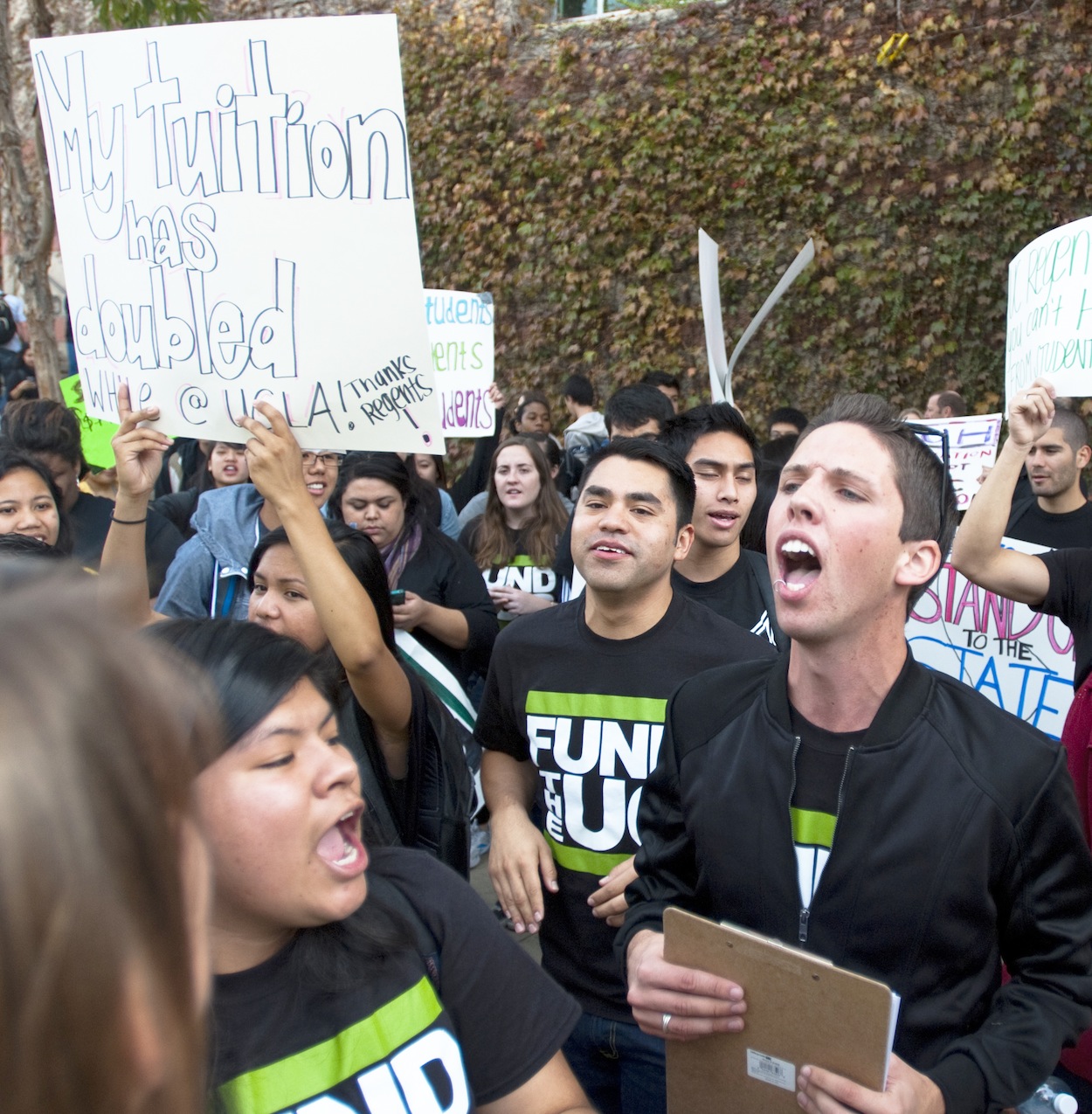Katie Shepherd: EVP Office support for Prop. 13 reform misguided

Members of Fund the UC protest a UC Board of Regents meeting outside the James West Alumni Center in November, 2011, asking the regents to endorse a plan that would modify Proposition 13.
By Katie Shepherd
Jan. 22, 2014 12:13 a.m.
“Simply put, California is broke.”
The statement, pulled directly from an event page on Facebook put up by the Undergraduate Students Association Council’s External Vice President Office, offers a sweeping explanation for the University of California’s inflated tuition rates.
This particular statement, as with many others in the event’s description, is flatly misleading.

To address the gaps in state funding that have led to the tuition increases, the EVP Office is hosting a “Day of Action” Wednesday in support of the University of California Student Association’s Fund the UC initiative to reform Proposition 13. Students at the event will be encouraged to sign postcards urging the Los Angeles Unified School District to stand in support of the reform.
Inexplicably, the UCSA and EVP fail to understand that Proposition 13 does not directly affect higher education funding. Proposition 13 reform, while potentially a good move for the state, would not impact the University’s tuition rates or budget. It’s perplexing, then, that two organizations whose purpose is to represent UC students would seize on that piece of legislation, hoping to drum up student signatures by connecting the dots on matters of state finance that are wholly separate from one another.
Proposition 13, passed by a referendum in 1978, caps local property taxes at 1 percent of the property value on the day of purchase. That’s very good for property owners, including some major corporations, who avoid high taxes that would otherwise fund community programs and K-12 schools, among other local municipal endeavors.
Maryssa Hall, USAC external vice president, said that those in favor of the reform hope that extra money generated by requiring commercial property owners to pay property taxes based on current value could be earmarked for higher education and the UC in particular, potentially contributing to a tuition rollback.
It is hard to make the case why students should spend time campaigning for this change under the guise of funding the UC and stopping massive tuition increases, when the premise of their campaign stands on clearly shaky ground. Multiple experts consulted for this column see only the weakest of connections between the law and UC tuition.
In an email, Jennifer Kuhn, an analyst at the nonpartisan Legislative Analyst’s Office, said that the UC does not traditionally draw from local property taxes and was probably unaffected by the law, though a formal analysis has not been done.
Two more analysts at the LAO, Paul Golaszewski and Brian Uhler, who specialize in the University of California and local government financing, respectively, said they do not see a direct connection between the UC budget and Proposition 13.
As Proposition 13 won’t help ease the burden of tuition for UC students, the EVP should turn away from a movement that incorrectly draws a one-to-one relationship between that law and UC funding.
The Fund the UC movement is understandably appealing to thousands of students who are struggling to pay tuition each quarter, and has a potentially important role in campus and system-wide advocacy. But the organization’s time and attention should be trained on issues that can have a real, direct impact year to year.
Fund the UC might find more immediate success by campaigning in support of the UC Board of Regents and UC President Janet Napolitano’s request for an additional $120.9 million proposed to California legislators in late 2013, adding student voice to the UC Office of the President’s push for greater support in the state’s annual budget. This could have an immediate effect on funding the UC.
Multiple attempts to reach representatives of the UCSA were unsuccessful.
The misleading analysis adopted by the EVP in pitching Proposition 13 reform to students is not isolated. Similarly confusing claims and facts can be found throughout the event’s description.
Let’s go back to the top: “Simply put, California is broke.”
Contrary to the claims of Fund the UC and the EVP office, California isn’t broke. The state generated enough revenue to run a surplus for the past two years.
Later, beneath a subtitle declaring these proclamations “the facts,” the event description bemoans the priorities of the state, saying education isn’t one of them.
But anybody who followed the 2012 election cycle can tell you the state’s recent political history says otherwise. Following the passage of Gov. Jerry Brown’s Proposition 30, the UC has seen some funding restored. Most visibly for students, tuition rates were frozen in return for a promised base 5 percent increase from the state.
Hall said that despite these increases, her office hopes that endeavors like Proposition 13 reform will result in tuition decreases rather than mere freezes. From a pragmatic standpoint, tuition rollbacks are a siren song in a time of fiscal tiptoeing in Sacramento.
This is made more concerning in the context of Proposition 13 reform: Promoting the reform with the promise of lowering tuition is disingenuous if no direct link exists between Proposition 13 and the UC budget.
Hall also said that an important aspect of reforming the law would be increased access to the UC because of better funding for K-12 schools. But if that’s the EVP’s goal, the organizers should say so. Obscuring the equally important issue of access behind “facts” about UC funding does the cause a disservice.
The EVP Office has the power to be a force for change in the UC, but it does not honor this position properly unless it campaigns wisely for issues that directly impact students.


